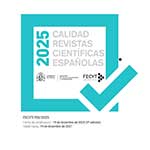Hidden cameras. Between law and ethics
Abstract
A recent judgment of the Spanish Constitutional Court prohibiting hidden camera like newsgathering technology in investigative journalism shows the need for studying this controversial method. The paper analyzes the “juriprudential-ethical doctrine" (Núñez Encabo, 2011: 169) on hidden camera which has elaborated the Commission of Complaints and Ethics of the FAPE. The aim is to examine the limits that it imposes to this tool and compare them with those that the Constitutional Court marks in order to determine the analogies and the differences in the interpretations of both organs.
Article download
License
In order to support the global exchange of knowledge, the journal Derecom. Derecho de la Comunicación is allowing unrestricted access to its content as from its publication in this electronic edition, and as such it is an open-access journal. The originals published in this journal are the property of the Complutense University of Madrid and any reproduction thereof in full or in part must cite the source. All content is distributed under a Creative Commons Attribution 4.0 use and distribution licence (CC BY 4.0). This circumstance must be expressly stated in these terms where necessary. You can view the summary and the complete legal text of the licence.







